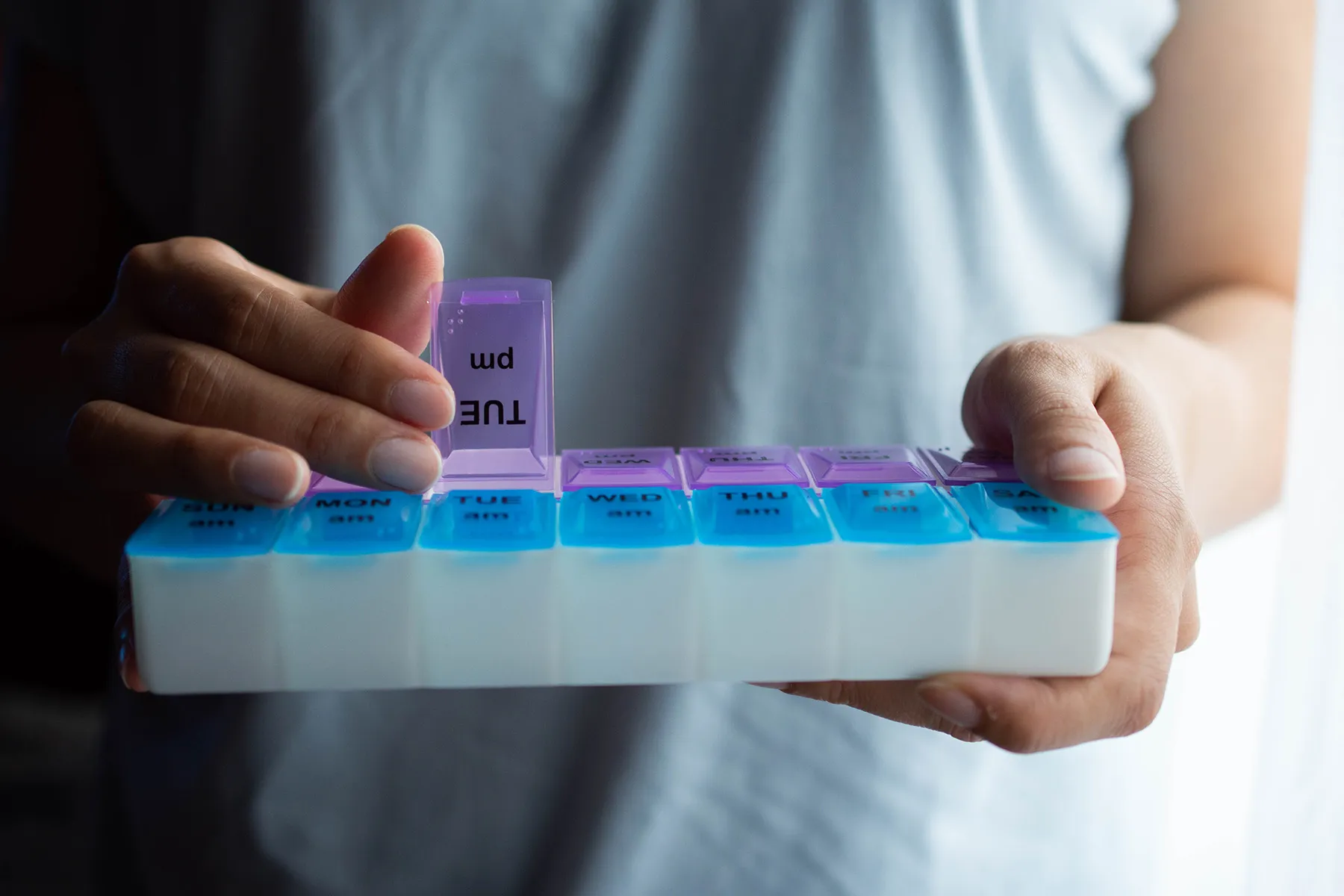HIV AIDS Medical Reference

Weighing the Pros and Cons of PrEP: Pills vs. Injectables
- 9 Things to Know About Emtricitabine/Tenofovir Disoproxil Fumarate (Truvada)
Learn more about this combination drug that treats and prevents HIV.
- FAQ About Emtricitabine and Tenofovir Disoproxil Fumarate (Truvada)
Learn more about this combination drug that can be used either to treat HIV or lower your risk of getting it.
- Managing Side Effects of Emtricitabine/Tenofovir Disoproxil Fumarate (Truvada)
Learn about potential side effects of this combination HIV medication, and get tips to prevent or manage them.
- Frequently Asked Questions About Cabotegravir (Apretude)
Learn more about cabotegravir (Apretude), including what it is, how it works, what its most common side effects are, and whether it’s approved for PrEP.
- Tips for Managing Side Effects of Cabotegravir (Apretude)
Here’s what to know about some common side effects of this injected drug that helps protect against HIV.
- 9 Things to Know About Cabotegravir (Apretude)
Learn how cabotegravir (Apretude) is used to help control HIV infection and lower your risk of complications so your immune system can work better.
- 6 Things to Know About Emtricitabine/Tenofovir Alafenamide (Descovy)
Emtricitabine/tenofovir alafenamide (Descovy) is a two-drug oral pill that can both treat and prevent HIV. Here are 6 things you need to know before you take this medication.
- Frequently Asked Questions About Emtricitabine/Tenofovir Alafenamide (Descovy)
Got questions about emtricitabine/tenofovir alafenamide (Descovy)? Here’s what to know about it – what it is, how it works, and more.
- Tips to Manage Side Effects of Emtricitabine/Tenofovir Alafenamide (Descovy)
As with any drug, emtricitabine/tenofovir alafenamide (Descovy) can cause mild to moderate side effects. In some cases, it could be life-threatening. Here are some tips to manage them.
- How to Choose the Right PrEP Medication for You
To prevent HIV infection, you now have several PrEP medications to choose from. Which one is right for you?
- Debunking 10 Common Myths About HIV Prevention
Are you worried about taking PrEP? These are the facts behind 10 common myths about this HIV-prevention medication.
- The Intersectionality of Race, Sexuality, and HIV Prevention
HIV is preventable and treatable. Yet Black and Hispanic people, especially young men, are disproportionately affected by HIV. Find out why certain groups aren’t getting preventative medicine and what can be done about it.
- Better Protection Against HIV Means Better Mental Health
Protecting yourself and others from HIV and other STIs can benefit your mental health, too.
- Who Is PrEP for?
How does PrEP prevent HIV and is it right for you?
- How Does HIV Prevention Medication Work?
Learn what PrEP medication is and how it works to protect you from HIV infection.
- Weight Changes and Body Image With HIV Treatment
Are you struggling with weight gain since starting HIV treatment? Find out what you can do to boost your body image and self-esteem.
- Taking Control of Your Treatment-Related Weight Gain at the Doctor’s Office
Are you struggling with weight gain from your HIV treatment? Here’s how to get the help you need from your doctor.
- What to Know About the CD4:CD8 Ratio Test
Find out what you need to know about the CD4:CD8 ratio test. Learn why your doctor asks for it, what information they get from it, and what it means for you.
- Drugs That Prevent Opportunistic Infections in HIV
HIV weakens your immune system, making you vulnerable to disease. There are many ways to protect yourself, including ART, vaccines, and other medicines.
- What to Know About HIV Booster Drugs
HIV treatment includes multiple drugs. If you’re taking a protease inhibitor for your HIV, a booster drug will help it work better. Learn more about how it works and what to watch for.
- HIV Screening: What to Know
Everyone should get screened for HIV between ages 13-64, and more often if you are at high risk. Here’s what to know about getting tested.
- HIV and Toxoplasmosis: What to Know
Learn more about this common infection in people with untreated HIV or AIDS.
- How HIV Case Managers Can Help You
Are you HIV-positive? Learn how an HIV case manager can help you access the services you need.
- What to Know About PrEP for Women
Concerned about getting HIV? PrEP might be right for you. Learn more about this drug that can ward off HIV infection, including who should take it, side effects, and more.
- Chronic HIV Infection: What to Know
Learn about this second phase of HIV and how you can keep it from progressing to AIDS.
- New HIV Treatments in Development
After major advances in HIV treatment over the last 25 years, new drugs and experimental treatments in the pipeline may bring more improvements to care.
- HIV Drug Assistance Programs
Learn about the many programs that provide financial help and support for people with HIV.
- HIV in Men Who Have Sex With Men: What to Know
Men who have sex with men (MSM) are at risk for HIV and must learn risk factors, plus how to prevent and treat infection to protect themselves and others.
- HIV in Women Who Have Sex With Women
Some women who have sex with women may believe they’re safe from HIV. But you can still get it. Find out the unique risks and how to avoid HIV.
- HIV and AIDS in Indigenous Communities
Learn how HIV affects American Indian and Alaska Native populations.
- Self-Care Guide for People With HIV
Self-care can improve your quality of life with HIV and make ART meds more effective. Get healthy tips for eating, exercise, managing stress, and staying at a healthy weight with HIV.
- What Transgender People Should Know About HIV and AIDS
For members of the transgender community, here’s what to know about protecting yourself from HIV and AIDS.
- HIV PEP After Rape and Sexual Assault
If you think you’ve been exposed to the HIV virus after sexual assault, medication may still protect you. Learn more about post-exposure prophylaxis (PEP).
- HIV in Rural Areas
HIV is on the rise in rural areas. A look at why this is happening and how communities are controlling the disease.
- Disparities in PrEP
PrEP (pre-exposure prophylaxis) is a game changer in the fight against HIV, but many at-risk people aren’t getting it. Learn why.
- Integrase Inhibitors for HIV: What to Know
Learn more about how this drug helps control the amount of HIV in your body.
- HIV/AIDS in Hispanic and Latino Populations
The rates of HIV/AIDS have declined overall, but the Hispanic/Latino communities still face high risks. Language barriers, stigma, poverty, and health care access affect screening and treatment, leaving Hispanic/Latino communities at risk of infection.
- HIV Drug Resistance: What to Know
HIV drug resistance can happen if HIV in your body mutates. Learn more about how this happens, how to avoid it, and what to do if you become resistant.
- NNRTIs for HIV
Learn more about how these drugs work and when your doctor might prescribe them.
- HIV and AIDS: What Story Do the Numbers Tell?
New HIV infection and survival rates are trending positively in the U.S. But differences among certain groups for both infection and treatment remain.
- HIV: What Is Treatment as Prevention?
HIV treatment as prevention can help you stay healthy and cancel out chances of transmitting the virus through sex. Learn how it works and who benefits.
- What to Know About Candidiasis When You Have HIV
HIV can make you more likely to get this fungal infection, which usually affects the mouth, throat, esophagus, or vagina. Learn the symptoms, treatments, and more.
- HIV Disclosure: What Does the Law Say?
The laws governing the privacy of your HIV status are complex. Learn when you have the right to keep it confidential and when you must share.
- What to Know When Traveling With HIV
If you have HIV, traveling internationally can sometimes be risky. Here’s what to do to help protect your health when visiting certain countries.
- HIV and Cervical Cancer: What's the Link?
If you have HIV, you’re six times more likely to develop cervical cancer. Here’s why.
- HIV and Alcohol: Consumption, Tolerance, Safety, and More
Alcohol and HIV are complicated topics when it comes to your medication, physical and mental health, and more. Find out what’s safe and what’s risky.
- Substance Abuse and HIV: What's the Link?
Substance abuse can harm your health, especially if you have HIV. It can make you more likely to get HIV or pass it on to someone else.
- What to Know About Secondary Immunodeficiency Disorders?
Secondary immunodeficiency disorders can develop at any time in your life. Here are some immunodeficiency causes, symptoms, and treatments to help you avoid such complications.
- What is Lymphocytopenia?
Lymohocytopenia refers to a deficiency of lymphocytes in the blood. Learn about the causes, symptoms, and treatment options for this condition today.
